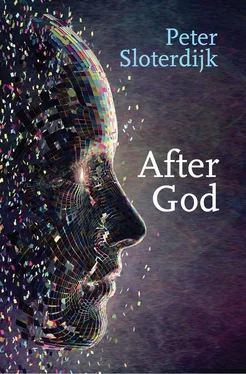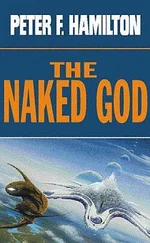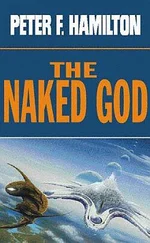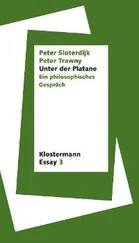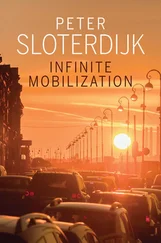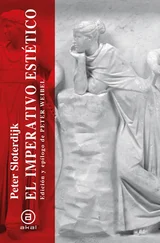*
The modern world exists because this attempt at conversion failed. Included in modernity is anyone who rejects the idea of a complete emptying of the future into the past and votes for the inexhaustibility of the future, even if this vote excludes the possibility of an omniscient god who, “after all time,” bends back, in a comprehensive retrospective on creation.
The “world” – a word that, as Nietzsche knew better than anyone, was for a long time a “Christian insult” 4– resisted the invitation to empty the future into total pastness, because it renounced the ontological precedence of the past. It offered resistance because, in its struggle with itself and through an autodidactic exertion of remarkable coherence, it had learned to give time its due. Ironically, this new attempt at a deeper understanding of time was carried out on European soil, of all things, the homeland of resolute stasis metaphysics and convulsive apocalypticism. In the philosophical thought of modernity, the fundamental openness of the future was appropriately grasped for the first time. At the intersection of will and representation, the world assumed the form of a project and undertaking. It is not the merchants and seafarers who are responsible for reforming the world into an ensemble of projects, but rather the thinkers who undid the metaphysical paralysis of the future. Thus figures such as Schelling, Hegel, Bergson, Heidegger, Bloch, and Günther, perhaps even Cusa, too, all assume prominent positions in the pantheon of “contemporary” philosophy. Above all others, it was these authors who put an end to the eviction of time and novelty from being. They burst the dead enclosures of ontology by placing time and the new at the heart of being.
Ancient Greek mythology had, from afar, anticipated the revenge of time against eternity. It did so when it took the liberty of suggesting that even the immortal gods must reckon with a disaster of a higher order. The Greeks called this power of destiny moira . It embodied an unspecified variable in the background of structural being. Working from the invisible realm, it allotted to all variables what was proper to them. It possessed complete power over the arrangements, the portions, the lots, the destinies. It “prevailed” as a power prior to power, as justice prior to justice, as destiny prior to destinies. It allowed the regime of the Olympians to come into being by effecting a division of powers at the level of the absolute; it demarcated each of the jurisdictions of the chief gods from one another. Hades is appointed ruler of the underworld, Poseidon ruler of what is covered by water, and Zeus ruler of the visible realm under the heavens. When each is allotted his portion from the whole, a decisive step has been taken in the civilizing of the gods.
Look how far removed we are, already at this stage, from the crude power monsters of the pre-Olympian forces, which always wished to dominate everything en bloc! We are still just as far removed from the god of the philosophers and his cyclothymic, now merciful now wrathful doppelganger, the god of theologians! Little is known, even today, about the damage that theologians caused when they elevated “the One” at the expense of “the many.” With their disastrous distinction between God and idols they gave rise to a theodicean epidemic that has still not died away. Didn’t Isaiah already deal with the gods of other peoples by depicting them as painted pieces of wood? 5Didn’t Nietzsche remark, still in the tonality of monotheistic religious satire, that “[t]he world has more idols than realities”? 6After the One had pushed the others to the margins, the gods faded into the twilight of exile. The appointed theologians nevertheless continue to believe that they have done the world the greatest service by making a large portion of humanity dependent on an intrinsically riven god, whose uniqueness was paid for by the cleverly masked incompatibility of his highest attributes.
In their supremacist zeal, the religious theologians had insisted on garbing God with the most radiant attributes: omnipotence and omniscience. 7They did not consider that their simultaneous proclamation of these attributes implanted a real and highly explosive contradiction into the Highest. Either God is omnipotent, in which case his creative will is always free to introduce novelty and can be mirrored by his knowledge only after the fact; or he is omniscient, in which case he must have used up all his creative power. Only in the latter case can he take an eternal holiday and look back on the universe of what has been.
Old European thought needed one and a half thousand years to detonate the contradiction concealed in the monotheistic concept of God. The bursting of this contradiction, which had been disguised for so long, was for the most part misunderstood as the atheistic crisis of the modern age. In truth what happened was that power and knowledge, both the higher and the lower forms, were interwoven and reconfigured. However, while the younger theologians, the Protestants above all, embraced modernity’s openness toward the future and, more or less tacitly, reconciled themselves to the loss of God’s omnipotence, 8contemporary Islam continues to make much ado about Allah’s omnipotence. Yet, because even Allah has long since become incapable of novelty and remains fixed in his past as creator, he can allow his allegedly still virulent omnipotence to be proven exclusively through the will to obliterate unrighteous creatures. 9The young murderers and suicides who break out into open jihad have grasped without any theology to what extent a god like Allah cuts an impossible figure as soon as he is observed against the backdrop of a modern world – that is, a world that has been rendered dynamic by human creativity. Nota bene: the fact that all human beings sooner or later die may be chalked up to nature or fatality, far from any idea of God. Yet the fact that individual mortals engage in premature obliteration and that the obliterators often sacrifice themselves in the process, in a dull and heroic sort of way, is now, in all seriousness, supposed to show evidence of the spirit and power of Allah. The young fanatics do not suspect how much they, through their actions, stand proof of the sterility of a decrepit theological culture. It will be a while before more people realize that the terror practiced by Islamists against the “unfaithful” within and outside the “house of Islam” is a demonstration of how the twilight of Allah is enacted. Assassinations are wayward proofs of a god who no longer understands the world.
The unresolved question of creativity stands at the center of the theological crisis of Islam. It is at once a question about technology and a question about the right to make images. The problem cannot be solved by means of the Qur’an. The Islamic nations, in total, do in fact take part in the creativity of modernity, especially in its advanced technological accomplishments, but so far only from the standpoint of the user. They have not proceeded to the level of “technological existence.” 10They do not produce what they use; they do not generate what they take by the hand. They have neither accepted the principle of translatio creativitatis [transfer of creativity] 11nor grasped it as the task of our times.
*
It would be an exaggeration to say that, in the implicit theology of Greek mythology, there is an underlying premonition of what other mythological traditions called a “twilight of the gods.” Moira , after all, implies the thought of a regime that grants gods their “constitution.” (Rousseau’s claim that a nation of gods would inevitably govern itself democratically is metaphysically ignorant; for, to judge by everything we know about the gods, they tend to pick out a sovereign on the spur of the moment.) Moira says nothing about a possible end of the immortals.
Читать дальше
